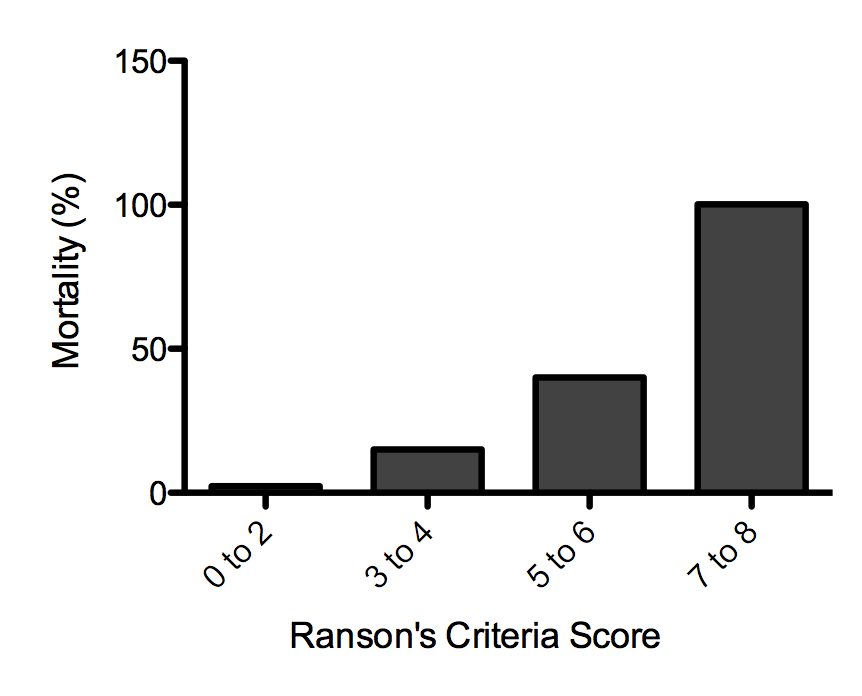WBR1491: Difference between revisions
No edit summary |
m (refreshing WBR questions) |
||
| Line 1: | Line 1: | ||
{{WBRQuestion | {{WBRQuestion | ||
|QuestionAuthor=William J Gibson | |QuestionAuthor=William J Gibson | ||
|ExamType=Surgery Shelf | |ExamType=Surgery Shelf | ||
Latest revision as of 02:46, 28 October 2020
| Author | PageAuthor::William J Gibson |
|---|---|
| Exam Type | ExamType::Surgery Shelf |
| Main Category | MainCategory::Pancreatic and Hepatic |
| Sub Category | SubCategory::Diagnosis |
| Prompt | [[Prompt::A 58 year old man presents to the emergency department with upper abdominal pain. He was playing poker and drinking whiskey with his friends when the pain began. He describes the pain as radiates to the back, 8/10 and colicky. On physical exam, the patient exhibits unintentional guarding and the abdomen is rigid. Laboratory evaluation reveals the following:
Sodium: 135 Potassium: 4.1 Chloride: 100 Calcium: 10.1 Hematocrit: 40% Hemoglobin: 13 mg/dL WBC: 20,000 cells/mm3 Neutrophils: 15,000 Amylase: 500 mg/dL Lipase: 1,000 mg/dL LDH: 385 mg/dL AST: 400 mg/dL ALT: 250 mg/dL Which of the following is not a component of the criteria typically used for risk assessment in this patient's condition?]] |
| Answer A | AnswerA::WBC count |
| Answer A Explanation | AnswerAExp::A white blood cell count greater than 16,000 is one of the Ranson's criteria on initial presentation. |
| Answer B | AnswerB::Serum amylase |
| Answer B Explanation | AnswerBExp::Serum amylase is not one of Ranson's criteria. Nonetheless, serum amylase is highly sensitive for diagnosing acute pancreatitis. |
| Answer C | AnswerC::Serum LDH |
| Answer C Explanation | [[AnswerCExp::Serum LDH > 350 is one of Ranson's criteria. LDH is released from dying liver cells and is a sensitive measure of liver injury that can be secondary to leakage of pancreatic digestive enzymes.]] |
| Answer D | AnswerD::Serum glucose |
| Answer D Explanation | [[AnswerDExp::Serum glucose >200 is one of Ranson's criteria. Hyperglycemia can occur in she pancreatitis due to a decrease in insulin secretion from pancreatic beta cells.]] |
| Answer E | AnswerE::Age |
| Answer E Explanation | [[AnswerEExp::Age >55 is one of Ranson's criteria.]] |
| Right Answer | RightAnswer::B |
| Explanation | [[Explanation::The patient in this vignette has pancreatitis. Patients typically present with severe, colicky abdominal pain that gets worse with ingestion of food. Risk factors for pancreatitis include alcohol (35%), gallstones (45%), hypertriglycerideemia, obesity and family history.
Ranson's criteria is used for prognosis in pancreatitis. There are two sets of criteria that compose Ranson's criteria: criteria on admission and criteria at 48 hours. Ranson's criteria on admission:
1. Glucose > 200 These criteria can be remembered with the mnemonic GA LAW. The criteria at 48 hours are:
1. Calcium < 8 mg/dL These criteria can be remembered with the mnemonic C HOBBS (like Calvin and Hobbes). Ranson's criteria predict mortality in acute pancreatitis as summarized in figure 1. Acute medical treatment for pancreatitis consists of aggressive fluid administration, and narcotics for pain. Once discharged, patients should be advised to avoid any alcohol consumption. Occasionally, patients may have recurrent unrelenting pain for which surgical treatment is indicated.
Figure 1. Ranson's score vs mortality. |
| Approved | Approved::Yes |
| Keyword | WBRKeyword::Pancreatitis, WBRKeyword::Prognosis, WBRKeyword::Ranson's criteria, WBRKeyword::Pancreas |
| Linked Question | Linked:: |
| Order in Linked Questions | LinkedOrder:: |
